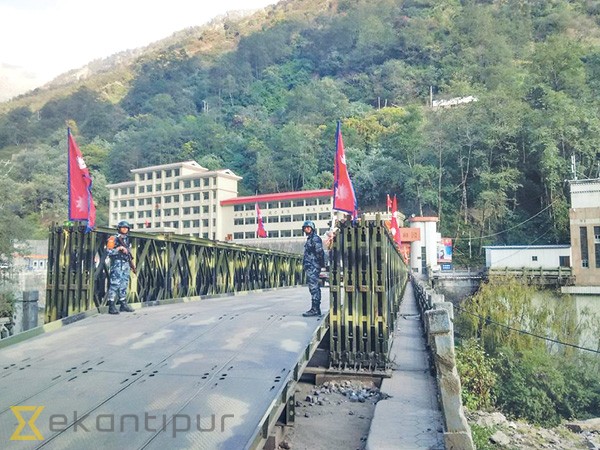
The Tatopani border crossing, a major transit point between Nepal and China, which was closed after the April 25 earthquake, is yet to open, even after eight months since the quake. As a result, the Tatopani bazaar, which once used to be a bustling town, now wears a deserted look.
Locals have been eagerly waiting for trade resumption through the border point for the last eight months, with no concrete information from the Chinese side about reopening of the border. “We have lost our businesses and employment,” said Bahadur Sherpa who owns a hotel in Tatopani, urging the government to do the needful to open the border as soon as possible.
“We can resume export and import if China opens border,” said Kamal Shrestha, Chairman of the Sindhupalchowk chapter of the Federation of the Chambers of Commerce and Industry.
Local politicians and people here say this is a historic border point that has linked Nepal with China for decades.
While Tatopani border point features prominently in the government’s plan to diversify trade with China in the wake of an unofficial blockade imposed by India, there has been no definite information from the Chinese side on the resumption of the cross-border trade, Nepali officials said.
“We have held several rounds of negotiations at our level, but they have provided no indication about reopening the point,” said Dibayaraj Pokhrel, Chief Customs Officer of Tatopani Customs. “Therefore, there is a need of talks at top political level of two countries.”
Chairman of Parliament’s Development Committee Rabindra Adhikari, who inspected the border point on Friday, said that the House committee would soon direct the government to resolve the problems at the highest level.
According to Nepali officials on the ground, the Chinese side has formally raised two issues: the status of road which was damaged by earthquake and physical security while driving through these terrains in the aftermath of the earthquake.Despite clearing debris on the Nepali side, the 26-km Barhabise-Tatopani section of Araniko Highway still remains treacherous.
The risk of dry landslides is always there, according to officials. “The road needs
further maintenance, but heavy trucks and vehicles can pass through this section,” said CPN-UML leader Amrit Kumar Bohara, a local MP.
The halt in cross-border trade has hit government revenue and tourism, depriving both the state and the public of crucial earnings.
Tatopani used to collect over Rs 6billion annually, but for the last eight months, not a single rupee has been collected.
The tourism industry has also been hit. According to data provided by the customs office, up to 40,000 Indian tourists pass through Tatopani on their way to Kailash Mansobar every year.
Infrastructure development also has fallen through the cracks.
Before the earthquake, China was building a dry port at Tatopani VDC-4 to facilitate the ever-increasing trade through this border point. But now uncertainty is hanging over the construction of the dry port as well.
Meanwhile, the government has decided to expand Araniko Highway and China has expressed readiness to provide assistance. However, officials say, it is a long-term project. “We have set aside Rs 1.6 billion to repair and maintain the road,” said Keshab Kumar Sharma, Deputy Director General of Department of roads.